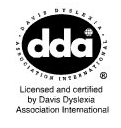Professional services described as Davis®, including Davis Dyslexia Correction®, Davis Symbol Mastery®, Davis Orientation Counseling®, Davis® Attention Mastery, Davis® Math Mastery, and Davis® Reading Program for Young Learners may only be provided by persons who are trained and licensed as Davis Facilitators or Specialists by Davis Dyslexia Association International.
Website by Never Alone Business Services
